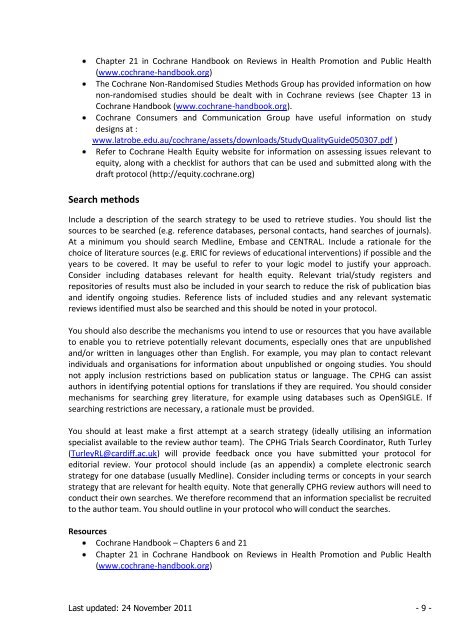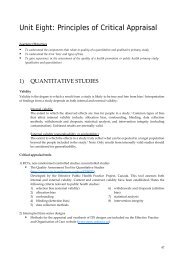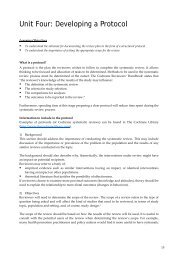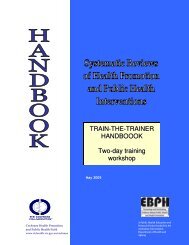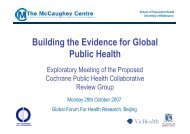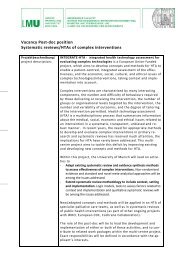Guide for Developing a Cochrane Protocol - Cochrane Public Health ...
Guide for Developing a Cochrane Protocol - Cochrane Public Health ...
Guide for Developing a Cochrane Protocol - Cochrane Public Health ...
You also want an ePaper? Increase the reach of your titles
YUMPU automatically turns print PDFs into web optimized ePapers that Google loves.
Chapter 21 in <strong>Cochrane</strong> Handbook on Reviews in <strong>Health</strong> Promotion and <strong>Public</strong> <strong>Health</strong><br />
(www.cochrane-handbook.org)<br />
The <strong>Cochrane</strong> Non-Randomised Studies Methods Group has provided in<strong>for</strong>mation on how<br />
non-randomised studies should be dealt with in <strong>Cochrane</strong> reviews (see Chapter 13 in<br />
<strong>Cochrane</strong> Handbook (www.cochrane-handbook.org).<br />
<strong>Cochrane</strong> Consumers and Communication Group have useful in<strong>for</strong>mation on study<br />
designs at :<br />
www.latrobe.edu.au/cochrane/assets/downloads/StudyQuality<strong>Guide</strong>050307.pdf )<br />
Refer to <strong>Cochrane</strong> <strong>Health</strong> Equity website <strong>for</strong> in<strong>for</strong>mation on assessing issues relevant to<br />
equity, along with a checklist <strong>for</strong> authors that can be used and submitted along with the<br />
draft protocol (http://equity.cochrane.org)<br />
Search methods<br />
Include a description of the search strategy to be used to retrieve studies. You should list the<br />
sources to be searched (e.g. reference databases, personal contacts, hand searches of journals).<br />
At a minimum you should search Medline, Embase and CENTRAL. Include a rationale <strong>for</strong> the<br />
choice of literature sources (e.g. ERIC <strong>for</strong> reviews of educational interventions) if possible and the<br />
years to be covered. It may be useful to refer to your logic model to justify your approach.<br />
Consider including databases relevant <strong>for</strong> health equity. Relevant trial/study registers and<br />
repositories of results must also be included in your search to reduce the risk of publication bias<br />
and identify ongoing studies. Reference lists of included studies and any relevant systematic<br />
reviews identified must also be searched and this should be noted in your protocol.<br />
You should also describe the mechanisms you intend to use or resources that you have available<br />
to enable you to retrieve potentially relevant documents, especially ones that are unpublished<br />
and/or written in languages other than English. For example, you may plan to contact relevant<br />
individuals and organisations <strong>for</strong> in<strong>for</strong>mation about unpublished or ongoing studies. You should<br />
not apply inclusion restrictions based on publication status or language. The CPHG can assist<br />
authors in identifying potential options <strong>for</strong> translations if they are required. You should consider<br />
mechanisms <strong>for</strong> searching grey literature, <strong>for</strong> example using databases such as OpenSIGLE. If<br />
searching restrictions are necessary, a rationale must be provided.<br />
You should at least make a first attempt at a search strategy (ideally utilising an in<strong>for</strong>mation<br />
specialist available to the review author team). The CPHG Trials Search Coordinator, Ruth Turley<br />
(TurleyRL@cardiff.ac.uk) will provide feedback once you have submitted your protocol <strong>for</strong><br />
editorial review. Your protocol should include (as an appendix) a complete electronic search<br />
strategy <strong>for</strong> one database (usually Medline). Consider including terms or concepts in your search<br />
strategy that are relevant <strong>for</strong> health equity. Note that generally CPHG review authors will need to<br />
conduct their own searches. We there<strong>for</strong>e recommend that an in<strong>for</strong>mation specialist be recruited<br />
to the author team. You should outline in your protocol who will conduct the searches.<br />
Resources<br />
<strong>Cochrane</strong> Handbook – Chapters 6 and 21<br />
Chapter 21 in <strong>Cochrane</strong> Handbook on Reviews in <strong>Health</strong> Promotion and <strong>Public</strong> <strong>Health</strong><br />
(www.cochrane-handbook.org)<br />
Last updated: 24 November 2011 - 9 -


